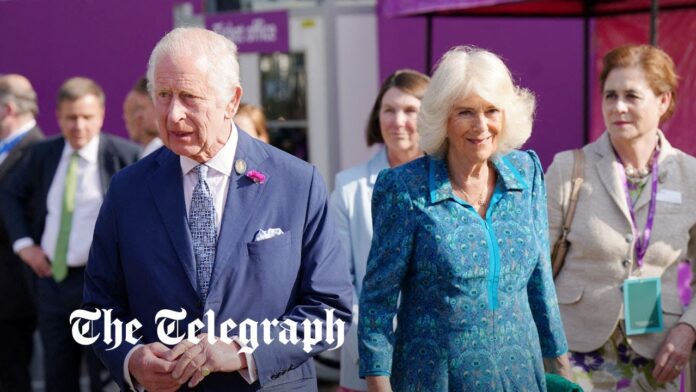Royal children and school kids from London delight monarchs with affectionate monikers during the Chelsea Flower Show
King Charles and Queen Camilla have acquired charming new nicknames, thanks to a group of enthusiastic primary school children from Sulivan Primary School in London. During their visit to the Chelsea Flower Show, the children christened the royals as “King of the Compost” and “Queen of the Bees,” a gesture that delighted the monarchs.
The children presented the new titles to the King and Queen during their visit to the ‘RHS No Adults Allowed Garden,’ a beautiful garden designed by Harry Holding and the students. The garden features a rich woodland, vibrant meadows, and wetlands filled with oversized bog plants, creating a colourful and unique landscape. The royals enjoyed their time at the garden, with King Charles expressing his approval of his new nickname, calling it “quite right.”
These new nicknames join a list of affectionate monikers that the royal couple have received over the years, especially from their grandchildren. Queen Camilla, known as “Gaga” to her grandchildren, shared that she has embraced this unusual name with joy. Reflecting on it, she said, “My own grandchildren call me Gaga. I don’t know if it’s because they think I am! It is funny but still very sweet.”
King Charles, on the other hand, is fondly called “Grandpa Wales” by Prince George, Princess Charlotte, and Prince Louis. This tradition of royal nicknames dates back to the late Queen Elizabeth, who was affectionately known as “Gan-Gan” by her great-grandchildren. Prince William himself contributed to the family’s history of unique nicknames when he called Queen Elizabeth “Gary” as a child, struggling to pronounce “Granny.”
The Chelsea Flower Show, an annual event that showcases horticultural excellence, provided a perfect backdrop for this heartwarming interaction. King Charles and Queen Camilla’s visit to the ‘RHS No Adults Allowed Garden’ not only highlighted their ongoing support for environmental causes but also emphasized their connection with the younger generation.
Analysis:
King Charles and Queen Camilla’s new nicknames, “King of the Compost” and “Queen of the Bees,” reflect their long-standing commitment to environmental conservation. King Charles, known for his environmental advocacy, has championed sustainable farming and conservation for decades. This playful moniker aligns with his efforts to promote composting and other eco-friendly practices.
From a sociological perspective, these affectionate nicknames symbolize the evolving nature of the British monarchy. The modern royals have increasingly engaged with the public, especially younger generations, in more informal and relatable ways. This approach helps bridge the gap between the monarchy and the public, fostering a sense of familiarity and accessibility.
Economically, the Chelsea Flower Show provides significant benefits to the local and national economy. The event attracts thousands of visitors each year, boosting tourism and supporting local businesses. The presence of the King and Queen at the show further elevates its profile, drawing media attention and increasing public interest.
Locally, the involvement of Sulivan Primary School in designing a garden for the Chelsea Flower Show highlights the importance of community engagement in such prestigious events. It offers students a unique opportunity to showcase their creativity and gain recognition for their efforts. The interaction between the royals and the children also underscores the value of educational initiatives that promote environmental awareness.
The gender perspective is notable as well. Queen Camilla’s nickname, “Gaga,” which she proudly embraces, challenges traditional expectations of royal decorum. It reflects her willingness to adopt a more approachable and affectionate persona, resonating with both her family and the public. This shift towards a more relaxed and personable image can influence public perceptions of the monarchy, making it appear more relatable and modern.
On a broader scale, the affectionate nicknames given to the King and Queen by their grandchildren and the public demonstrate the enduring significance of familial bonds within the royal family. These nicknames humanize the royals, allowing the public to see them as grandparents and family members, rather than distant figures of authority.
In conclusion, the new nicknames for King Charles and Queen Camilla at the Chelsea Flower Show highlight their connection with the younger generation and their ongoing commitment to environmental causes. These affectionate monikers, along with the historical tradition of royal nicknames, contribute to the evolving image of the British monarchy as more approachable and relatable. The event itself underscores the importance of community engagement, economic benefits, and the modern dynamics of royal public relations.
